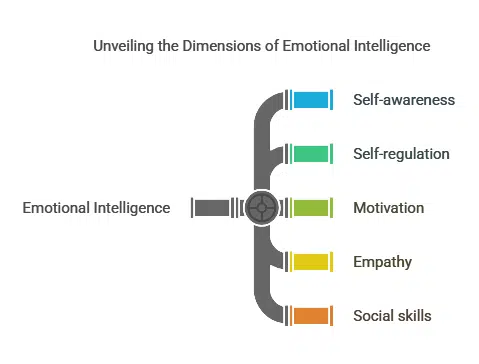In today’s fast-paced world, maintaining mental wellness is more critical than ever. While many focus on physical health, emotional intelligence is a key factor that often goes unnoticed in the pursuit of a balanced and fulfilling life.
Emotional Intelligence Can Enhance Your Mental Wellness by fostering self-awareness, improving relationships, and building resilience against life’s challenges.
This article dives deep into how Emotional Intelligence Can Enhance Your Mental Wellness and offers practical ways to integrate it into your daily routine.
Understanding Emotional Intelligence
What Is Emotional Intelligence?
Emotional intelligence refers to the ability to recognize, understand, and manage your own emotions while also being able to empathize with and influence the emotions of others. It consists of five core components:
- Self-awareness: Understanding your emotions and how they impact your actions.
- Self-regulation: Managing your emotions in healthy and constructive ways.
- Motivation: Staying driven to achieve your goals despite setbacks.
- Empathy: Recognizing and understanding the emotions of others.
- Social skills: Building and maintaining positive relationships.
How Emotional Intelligence Impacts Mental Wellness?
Emotional Intelligence Can Enhance Your Mental Wellness by reducing stress, promoting emotional balance, and fostering a sense of control over your life.
Research shows that individuals with high emotional intelligence are better equipped to handle life’s challenges, making them more resilient and adaptable.
A 2024 survey by the Global Wellness Institute revealed that 78% of participants who actively practiced emotional intelligence techniques reported higher levels of mental satisfaction.
10 Ways Emotional Intelligence Enhances Your Mental Wellness
1. Improves Self-Awareness
Understanding your emotions is the first step toward better mental wellness. By becoming more self-aware, you can:
- Identify emotional triggers.
- Recognize patterns in your behavior.
- Make conscious choices that align with your values.
Practical Tips:
- Keep a journal to track your emotions and reflect on how they influence your actions.
- Regular journaling not only improves awareness but also helps you understand recurring themes in your emotional patterns.
Example: A professional noticing they frequently feel overwhelmed during meetings might identify stress as a trigger and develop strategies to manage it, like preparing more thoroughly or practicing relaxation techniques.
Self-Awareness Benefits
| Benefit | Description |
| Recognizing triggers | Helps prevent reactive behaviors |
| Emotional insight | Leads to more intentional decision-making |
| Greater self-control | Reduces impulsive reactions |
2. Enhances Stress Management
Emotional Intelligence Can Enhance Your Mental Wellness by helping you identify stressors and respond to them in healthier ways.
Techniques such as mindfulness and breathing exercises can help reduce the physiological effects of stress.
Key Strategies:
- Practice mindfulness meditation to stay present.
- Use deep-breathing techniques to calm your mind.
- Engage in physical activity to release tension.
- Leverage stress-tracking apps to monitor and manage daily triggers.
Example: A 2023 study by the American Psychological Association found that individuals who practiced mindfulness for 15 minutes daily reported a 30% reduction in stress levels.
Similarly, workplace studies show that integrating short breathing exercises into daily routines boosts focus and reduces workplace fatigue.
Stress Management Techniques
| Technique | Benefit |
| Mindfulness meditation | Reduces anxiety and increases focus |
| Deep breathing exercises | Lowers heart rate and calms the mind |
| Physical activity | Boosts endorphins and relieves tension |
3. Builds Stronger Relationships
Empathy, a cornerstone of emotional intelligence, enables you to connect deeply with others. Emotional Intelligence Can Enhance Your Mental Wellness by fostering trust, mutual understanding, and emotional support—key ingredients for mental wellness.
Actionable Steps:
- Practice active listening during conversations.
- Show genuine interest in others’ feelings and experiences.
- Use empathetic responses to validate others’ emotions.
Case Study: A 2022 Harvard study revealed that teams with high empathy levels reported 25% greater collaboration and satisfaction among members.
In family settings, empathetic communication has been linked to higher levels of trust and reduced conflict.
Empathy in Relationships
| Skill | Impact |
| Active listening | Builds trust and reduces misunderstandings |
| Emotional attunement | Strengthens bonds and fosters mutual respect |
| Validation | Creates a safe space for open communication |
4. Promotes Positive Communication
Clear and constructive communication reduces misunderstandings and strengthens relationships.
Emotional Intelligence Can Enhance Your Mental Wellness by allowing you to express your emotions effectively without creating conflict.
Tips for Better Communication:
- Use “I” statements to express feelings without blaming others.
- Pay attention to nonverbal cues.
- Be mindful of your tone and body language.
Example: In workplace settings, emotionally intelligent leaders who communicate openly see a 20% higher employee engagement rate. Similarly, families practicing positive communication report fewer misunderstandings and stronger bonds.
Communication Tips
| Technique | Outcome |
| Using “I” statements | Reduces defensiveness in conversations |
| Observing body language | Enhances message clarity |
| Constructive feedback | Encourages growth and trust |
5. Fosters Resilience
Emotional Intelligence Can Enhance Your Mental Wellness by helping you bounce back from adversity.
Recognizing and reframing negative thoughts allows you to maintain a positive outlook.
Resilience-Building Techniques:
- Practice gratitude daily.
- Reframe challenges as opportunities for growth.
- Develop a strong support system to lean on during tough times.
Example: Research shows that individuals with high emotional intelligence recover 50% faster from emotional setbacks compared to those with lower EI levels.
A 2024 case study on disaster survivors found that those practicing gratitude and self-reflection were more likely to exhibit resilience.
Building Resilience
| Practice | Benefit |
| Gratitude journaling | Shifts focus to positive aspects of life |
| Reframing thoughts | Promotes optimism and problem-solving |
| Seeking support | Reduces feelings of isolation |
6. Encourages Better Decision-Making
Emotional Intelligence Can Enhance Your Mental Wellness by enabling you to balance logic and emotions in decision-making, leading to more thoughtful and effective choices.
Example: When faced with a tough decision, emotionally intelligent individuals are more likely to consider long-term consequences rather than react impulsively. Studies reveal that high EI correlates with better financial and personal decisions.
Decision-Making with EI
| Aspect | Benefit |
| Balancing emotions | Avoids impulsive choices |
| Weighing outcomes | Leads to informed and rational decisions |
| Emotional regulation | Reduces decision-making fatigue |
7. Supports Mental Clarity
By managing emotional overwhelm, you can maintain focus and clarity, improving your ability to prioritize tasks and achieve goals.
Emotional Intelligence Can Enhance Your Mental Wellness by helping you stay grounded and organized.
Strategies for Mental Clarity:
- Break tasks into manageable steps.
- Take short breaks to refresh your mind.
- Practice deep focus techniques, such as the Pomodoro method.
Example: A study by the Journal of Cognitive Enhancement highlighted that individuals using focus techniques experienced a 40% improvement in productivity.
Mental Clarity Boosters
| Technique | Purpose |
| Task segmentation | Reduces overwhelm |
| Pomodoro method | Enhances focus and productivity |
| Regular breaks | Prevents burnout |
8. Cultivates a Positive Mindset
Emotional Intelligence Can Enhance Your Mental Wellness by fostering optimism, which is essential for mental wellness.
By focusing on the positive, you can reduce the impact of negative emotions.
How to Cultivate Positivity:
- Surround yourself with supportive people.
- Practice positive affirmations.
- Celebrate small victories to build momentum.
Example: Positive affirmations have been shown to reduce stress and increase motivation in individuals struggling with self-doubt. Groups practicing gratitude reported a 35% increase in overall happiness in a 2023 survey.
9. Reduces Anxiety and Depression
Managing emotions through emotional intelligence can help mitigate feelings of anxiety and depression.
Emotional Intelligence Can Enhance Your Mental Wellness by equipping you with tools to navigate emotional challenges.
Examples:
- Challenge negative thought patterns.
- Focus on what you can control.
EI for Mental Health
| EI Practice | Mental Health Benefit |
| Cognitive reframing | Reduces anxiety and promotes positivity |
| Emotional awareness | Lowers depression risks |
| Goal setting | Provides a sense of purpose |
10. Promotes Emotional Freedom
Understanding and expressing your emotions leads to a sense of inner peace and emotional freedom.
Emotional Intelligence Can Enhance Your Mental Wellness by helping you embrace authenticity and emotional balance.
Steps to Emotional Freedom:
- Allow yourself to feel and express emotions without judgment.
- Seek support when needed.
Steps to Emotional Freedom
| Practice | Outcome |
| Vulnerability | Builds stronger connections |
| Self-expression | Reduces emotional burdens |
| Seeking help | Creates pathways to growth |
Practical Tips to Boost Your Emotional Intelligence
Daily Practices to Develop Self-Awareness
- Spend 5 minutes daily reflecting on your emotions.
- Use mood-tracking apps to identify patterns.
Exercises to Improve Empathy and Communication Skills
- Engage in role-playing scenarios to better understand others’ perspectives.
- Practice giving and receiving feedback constructively.
Tools and Apps for Tracking and Managing Emotions
- Moodpath: A mental health tracking app.
- Headspace: For mindfulness and meditation.
- Reflectly: A journaling app to promote self-awareness.
Takeaways
Emotional Intelligence Can Enhance Your Mental Wellness in profound and lasting ways. By improving self-awareness, managing stress, fostering resilience, and cultivating positive relationships, you can lead a more balanced and fulfilling life.
Start integrating these principles into your daily routine to experience the transformative power of emotional intelligence today.
Remember, small changes can lead to significant improvements in your mental well-being.







































